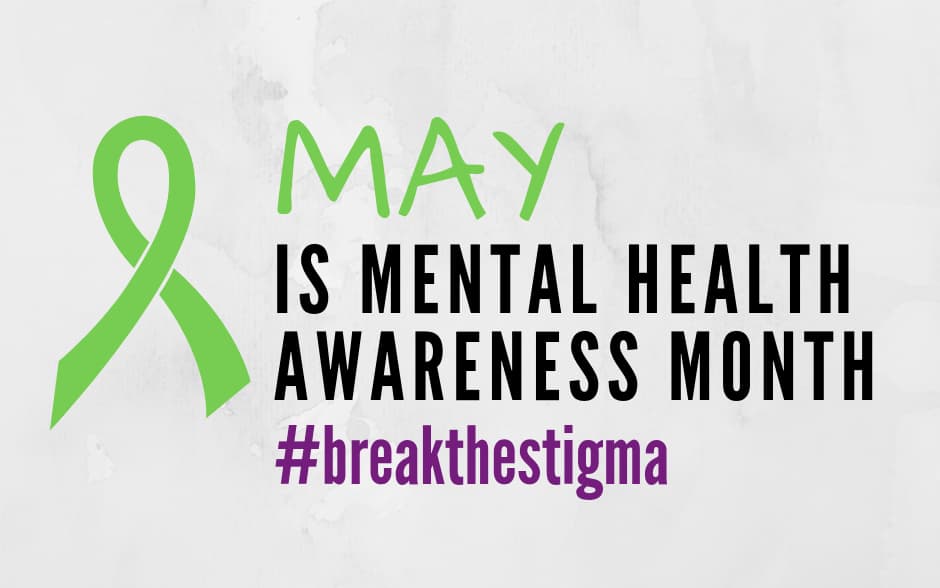Do you ever find yourself following national awareness days and months? I’m sure there is a cute picture of your spouse, dog, or you eating a slice of pizza with the hashtag #nationalspouseday, #nationaldogyday, or #nationalpizzaday on your social media page somewhere. Like most, you want to highlight those special people, four legged family members, and favorite meals in your life. Well—have you considered the awareness around your mental health? Did you know May is dedicated to Mental Health Awareness? If not, that is of course perfectly okay, that’s what this entire blog post is all about.
Mental Health Awareness Month started in the United States in 1949 by an organization by the name of Mental Health America. As you can guess, its purpose was to increase awareness and educate the community about mental illness. Roughly around 1 in 5 American adults experience some form of mental illness. That looks like you out of 4 of your closets friends. That could be several college students within their lecture courses. Or maybe even multiple people you come in contact with daily. But you would never know because no matter how much awareness there is, a stigma continues to remain with having a mental illness or unstable mental health.
Shame around mental illnesses and mental health requires recognition. Although, a month is a great dedication, it is certainly not enough to end the stigma around depression, anxiety, schizophrenia, bipolar disorder, obsessive compulsive disorder, and many other diagnoses you find in the Diagnostic and Statistical Manual of Mental Disorders. Aside from the dismissal and embarrassment around a mental disorder people often struggle with ways to learn or educate themselves even if they don’t seek support. That is why having safe spaces where professionals, advocates, and supporters of these illnesses are warranted.
Mental health is care is just as valuable as physical health care. If national awareness is normalized for diabetes, heart disease, HIV/aids, and sickle cell it is necessary to do the same for mental health. There are often easily accessible resources for physical health disorders compared to mental health which is why raising awareness not only for yourself and others can be detrimental. It is a service duty of mankind to ensure those whom maybe struggling remember they are not alone.
NAMI, the National Alliance of Mental Health stresses the important of not being alone. When it comes to people experiencing a mental illness, they often appear to feel isolated or in solitude. That is further from the truth. Millions of individuals find themselves gaining hope, clarity, and support in silence. If the world continues to allow souls to be silent in their mental health, suicide will increase from the 10th leading cause of death to a much greater number. That brings me to awareness around suicide rates. Research has established suicide is the second leading cause of death in ages 10-34. That could be a younger sibling, cousin, child, a friend, a mom or a dad. To learn that so many individuals die at an early age before they develop is extremely alarming that creates the drive to advocacy.
Advocating and bringing awareness to mental health is simple. The first thing it takes is a listening ear or ability to direct someone to the appropriate resource. When some is mentally in need it is difficult to express themselves because of fear of judgment. Taking the time to be supportive could save someone’s life. As important as it is to me to shed light on mental health there are several resources that can provide additional information and insight around statistics and facts about mental illness.
If you or someone you know wanting to learn more about mental health please take them time to visit nami.org, mhresources.org, psychiatry.org, and several others. Ways to take care of or assist someone with their mental health includes reaching out a therapist which can be found on psychologytoday.com, therapyforblackgirls.com or contacting the National Suicide Prevention Lifeline at 800-273-8255.
A final reminder is that mental health awareness does not always consist of serve mental health behaviors. It also encourages anyone to place value on taking care of their mental health. Checking in with ourselves to ensure we are kind to self and others, taking a break, a walk, reading a book, setting healthy boundaries, and not allowing unhealthy habits take control. Mental health awareness should always remain a priority, not just for one month but every day of your life! So the next time you share a national awareness picture remember to include how you are aware of being mental healthy!

